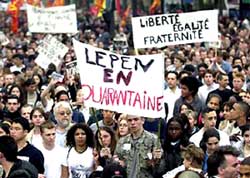French elections: centrist to face rightwinger in second round
By
G. Dunkel
Published Apr 28, 2007 5:22 PM
Over 84 percent of registered voters cast their ballots April 22 for one of the
dozen candidates running in the first round of France’s presidential
election. The two candidates going on to the May 6 second round are Nicolas
Sarkozy of the right-wing Union for a Popular Movement (UMP), who got 31.2
percent of the vote, and Ségolène Royal of the centrist Socialist
Party with 25.9 percent. These vote totals are the official results released by
the Ministry of the Interior.
|
French demonstrators say ‘quarantine’
fascist
Jean-Marie Le Pen.
|
While the U.S. news media are presenting the second round as a clear choice
between left and right, it really is a choice between a candidate, Royal, who
offers a soft approach to controlling and exploiting the workers and the
oppressed and another candidate, Sarkozy, who has a hard and abrasive
approach.
Sarkozy has been particularly hostile toward the working-class families of
North African and sub-Saharan African origin who live in the suburbs, or
banlieues, of French cities. There was a large turnout of voters there.
In 2005, the banlieues erupted in a six-week-long rebellion over racist police
repression, poor housing, lack of jobs and lack of opportunities. Thousands of
cars, government buildings—like police substations and post
offices—and bank branches were burned.
Sarkozy was interior minister at the time, and in charge of putting down the
rebellion. He used violent force and vitriolic denunciation, calling the
protesters “scum and riffraff” who should be “power hosed out
of their communities and France.” A large majority of those arrested were
French citizens, born in France, although often with parents or grandparents
who were immigrants.
After the revolt, there was an intense voter registration campaign in the
banlieues, along with a major effort to document their grievances and let the
broader French public know what they are. Over a million people in the
banlieues registered and most of them voted April 22.
This revolt was a major but not open issue in the campaign. The pro-capitalist
candidates preferred talking about identity, nationality and patriotism. Royal
accused Sarkozy of inflaming divisions and opening up gulfs among the French
people. Her solution, however, was to urge students to learn the French
national anthem and for families to keep a French flag in their pantry to
display on patriotic holidays like Bastille Day.
Sarkozy urged tough enforcement of existing laws and tough new laws. He wants
illegal immigrants rounded up and expeditiously sent home.
Sarkozy also wanted to win some of the supporters of Jean-Marie Le Pen, the
candidate of the National Front (FN). The FN is called “far right”
but a better characterization of it is “fascist.” Le Pen boasts of
having been an intelligence officer during the Algerian War, and a number of
2002 news reports conclusively tied him to cruel, bloody torture of supporters
of Algerian freedom during that war to maintain France’s empire.
In 2002, because the Socialist Party candidate did so poorly, Le Pen managed to
come in second. At that time the vast majority of left voters cast their
ballots for the center-right Jacques Chirac, who won in a landslide.
Le Pen’s presence in the 2007 campaign opened up a huge debate on the
left. The question was whether to vote for real left candidates who opposed the
neoliberal policies of privatization and cutting social services that were
favored by all the capitalist candidates including Royal—or to vote for
Royal to make sure she, and not Le Pen, would make the second round.
This debate cut the left parties’ vote totals, which all together was
only 10.5 percent. It was particularly sharp in the Communist Party, which drew
under 2 percent of the vote, an historic low. But all the parties and
organizations on the left had to address it.
Many believe that if the left parties had been able to maintain the unity they
achieved during the campaign that defeated the European Union Constitution in
2005, they would have been able to run a more powerful campaign to challenge
the neoliberal policies of the major capitalist parties.
The left party that most clearly solidarized itself with the struggles of the
banlieues, the Revolutionary Communist League (LCR), did the best among the
left with 4.1 percent of the vote. Neither the Workers Struggle party, the
ecologists nor anti-globalization leader Jose Bove was able to have a
significant impact.
Articles copyright 1995-2012 Workers World.
Verbatim copying and distribution of this entire article is permitted in any medium without royalty provided this notice is preserved.
Workers World, 55 W. 17 St., NY, NY 10011
Email:
[email protected]
Subscribe
[email protected]
Support independent news
DONATE


